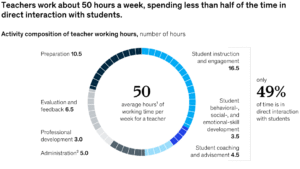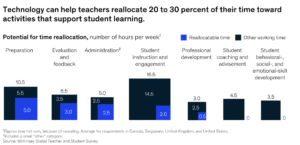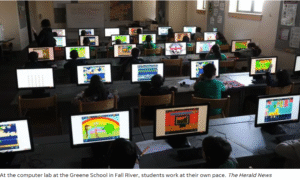As a middle years teacher, I don’t think my opinion on this topic will change anytime soon. I believe the use of technology in the classroom is both important and relevant, especially given the expectations placed on us by the division. Like I mentioned during the debate, it’s not just about using tech, it’s about how, why, and when we use it. I don’t think technology needs to be used every day or in every scenario, but it does open up a lot of possibilities for teaching and learning.
In my initial post, I mentioned tools like IXL, EDSBY, Word, OneNote, Teams, PowerPoint, Canva, Sway, and others. These can be used meaningfully in day-to-day teaching. Tech helps speed up lessons (when Wi-Fi is working) and often makes things more efficient than traditional pencil-and-paper tasks.
That said, I also see the flip side. Some teachers lean too heavily on technology, using it more to keep students occupied than for true learning. I get it, teaching today comes with big challenges: larger class sizes, mixed grades, and a wider range of student needs. Technology is convenient because it allows students to work at their own pace and keeps them engaged. The following images taken from the pro side of the debate’s article list just goes to show why teachers try and utilize technology as much as possible.


But I do wonder about fairness and consistency. Some students have ROAs that require the use of technology all the time, which helps them access the curriculum, but is it also holding them back from developing basic skills like printing, drawing, or writing by hand?
Sure, those things can now be done digitally too, but will students still develop the fine motor skills they may need later in life? Or is that no longer as relevant in today’s world?
From a parent’s perspective, I’ve seen the impact both ways. My child once had a teacher who didn’t “believe in” using computers, so even though his ROA required it, he rarely got the access he needed. That year was a real struggle. Tools like Word, the calculator app, and Google Translate made a huge difference in helping him learn and stay engaged. Without access to those, he was lost. In previous years, having access to a computer when needed helped him stay on track and fully engage, especially as he was learning a second language.
Still, one of the strongest points from the opposing side was about how distracting technology can be, and I totally agree. I see it every day. Even with close monitoring, it’s nearly impossible to catch everything. Students can be off-task so quickly playing games, chatting on Teams, or browsing off-topic sites. Yes, I can check in and monitor their activity, but let’s be honest, who has the time to do that constantly with 30+ students? The author of this article states that students “need to learn more effective self-control techniques to keep them focused on the learning at hand.” I agree with the point, but it’s just one more thing teachers are expected to teach even though there’s already not enough time in the day as it is.
At the end of the day, I believe technology really does enhance learning, but it has to be used alongside traditional tools like paper and pen. Too much of anything isn’t good. Like most things in education, it comes down to balance. Moderation, flexibility, and thoughtful planning are key to making tech work with us, not against us.
‘Blended learning’ brings computers into classrooms

Have a great evening everyone!

Hi Danielle,
Thank you for sharing your honest insights about technology in the classroom. I really appreciated how you acknowledged both the benefits and the challenges of using technology. Your point about the importance of how, why, and when we use technology really resonated with me—and that is exactly what we were trying to emphasize during the debate. Technology alone does not enhance student learning. It is not about using it for the sake of using it, but about making intentional, purposeful choices that truly support learning.
Your point about fairness and consistency raises an important question: can there be too much technology integration? While we are working to develop “digital citizens,” are we forgetting other essential skills? It is a great point and one that we, as educators, need to keep reflecting on.
While we both agree that technology enhances learning, I also share your concern that incorporating it into the classroom can be overwhelming and distracting. Even with the best intentions and monitoring tools, students can quickly get off task—and in large class sizes, it is simply not realistic to catch everything. Your point about self-regulation was very interesting. The article makes it sound so easy—like teachers can just introduce self-control strategies and students will easily adopt them. Yes, self-regulation is important, but in practice, it becomes yet another responsibility added to a teacher’s already overloaded plate.
Thank your for sharing!
Thanks Danielle!!! I absolutely love your point on fine motor skills. I will admit teaching in a university setting, the only students who use paper and pen are the later generation (aged 30 plus). I don’t come across many 18 year old’s who are not using a iPad or computer to take notes. However, in my area the issue I have is in the clinical setting (hospital) where EVERYTHING is still paper charted. I find a lot of the younger students are so reliant on spell check, grammar apps and typing they have lost a lot of those fine motor still of writing and also basic grammar and spelling. I have even had a student say to me “why do I need to learn how to spell when I can look it up!” OK OK I am also not the best speller and guilty of looking up words at times when I am paper charting but imagine how much more time it takes to look up spelling words when we are already so short of time in nursing.
You also got me thinking of your point about it not being about technology but HOW and WHY we are using it……. I started feeling really guilty as a parent of 3 girls who use tablets, iPhone, computers ect….. WHY are they using them? Now that school is out what is the point and not to point out my parenting flaws BUT, it is for ZERO educational purpose. I don’t think the latest story of my daughters friends $7.00 Starbucks iced drink or her new lululemon shorts is really enhancing my child’s learning. So I am now rethinking technology use in my home. Don’t worry, when I unplug the internet this summer I will tell her your to blame😊
Hi Danielle! I enjoyed your post. I would say my sentiments on technology in the classroom closely mirror yours, coming down to a balance of tech and no tech. I did vote ‘yes, tech enhances learning’ because I believe it can…when used with purpose.
I, too, see technology being used intentionally and unintentionally in classrooms everyday. It’s an easy filler, distractor, back up plan that, whether its meaningful learning or not, will engage our students. When used intentionally, tech can do incredible things – like support students who need those tools, enhance creativity, build digital skills, challenge students and so much more. As you say, too much of anything isn’t good and a balance is needed – sometimes easier said than done.
Do you think achieving balance with tech use will be challenging for RCSD teachers next year when grades four to twelve have 1:1 devices? I wonder if tech usage will majorly increase (because of sudden tech 100% access) and I wonder how teachers, schools, and the division will ensure technology stays an enhancement tool and not become the ‘be all and end all’ of learning.
Thanks for your thoughts here!
Teagan
Thanks for a thoughtful and well-written post, Danielle! One thing that really stood out to me is your question about fine motor skills. I’m interested in the debate coming up about teaching skills like cursive writing and if it is still relevant in the society we are living in….
I always aimed to give my students a little bit of time each week to rotate between typing skills and penmanship. For the students who struggled to hold a pencil correctly they worked on printing, and for those who wanted to learn cursive, we did cursive.
One thing that worried me is that my students were coming to sixth grade with absolutely zero typing skills, when I was working on typing in school back in 2003. We can push for a computer-free class, but at the end of the day, we can’t deny that this is a fundamental skill. It shouldn’t have to be one extreme or the other!
At the end of the day, we all just try to do what is best for our classrooms. Thanks for making me think on this one 🙂
As a PE teacher, I fully support the idea that technology is a tool—not the whole lesson. I mean, I could slap a fitness app on a screen and tell the kids to follow along with a virtual instructor… but nothing beats me yelling, “That’s not a plank, that looks like you are doing fully alive!” across the gym.
Tech is great when it works—like using video analysis so students can see their basketball form or tracking heart rate to understand exertion. But let’s be real: no tablet can teach you how to survive a game of dodgeball with 30 grade 8’s on a sugar high. That’s something you only learn in the trenches.
I’m all for balance. Use tech to enhance the lesson, not replace it. If the Wi-Fi’s down, I still have cones, jump ropes, and 30 students wondering what happened to “movement break.” (Spoiler: it just became movement class.)
So yes, tech helps—but it doesn’t replace experience, energy, or a solid whistle and a sense of humor!
Hi Danielle,
I completely agree, technology is inevitable at this point in society. It can hinder and help us depending on how we use it. I do worry, though too about the “old school” teachers who do not use a lot of technology in their teaching practice. They are still amazing teachers who do their job and then some. But the narrative now is that these teachers are ineffective or obsolete. While technology is a fundamental skill in society, some teachers do not have the tech-savvy to teach what these students need, and even monitoring it can be difficult if they do not understand what they are up against. I appreciated your parenting perspective on this post as well, that is something I do not yet have experience with, so it is interesting to see both sides!